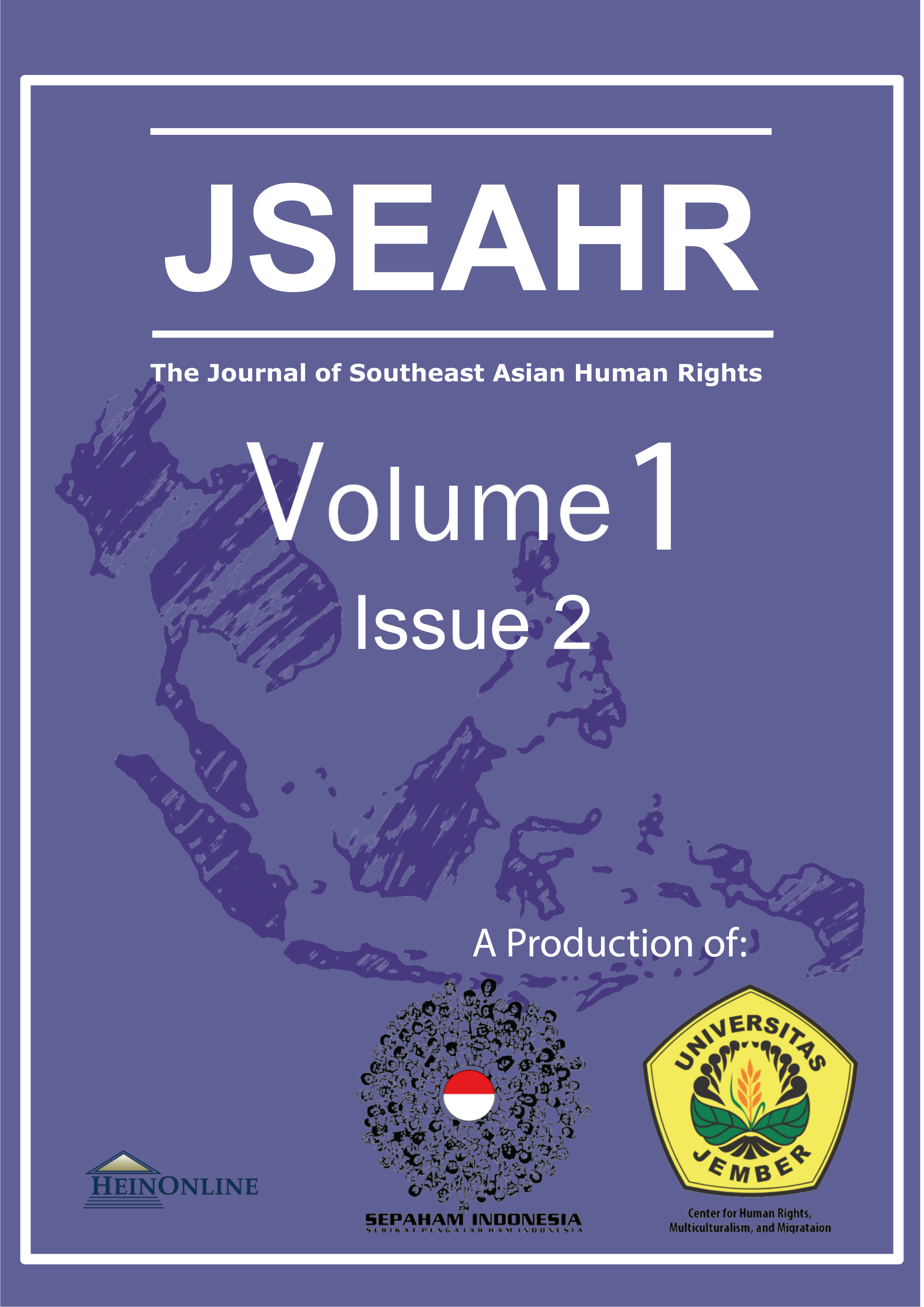The Role of Indonesian CSOs in Increasing the Understanding of Disabled Issues in the Indonesian Criminal Justice System
DOI:
https://doi.org/10.19184/jseahr.v1i2.6135Keywords:
Disability, Civil Society Organization, Criminal Justice SystemAbstract
Indonesia successfully amended Disabled People Law in early 2016. The fundamental amendment is creating equal rights and opportunity for disabled groups. Disability group in this context is the people who have physical and mental limitations to communicate and participate effectively with another people as equals. But, nowadays some people prefer using the term “difabled†than “disabledâ€.
Difabled alongside with feminist, LGBT and minority groups commonly known as a part of discriminated groups in society. Difabled activist believe that difabled is a natural part of human diversity – something that should be valued and respected, rather than pitied, feared and discriminated. Difabled people are potentially to be victim 4-10 times more than other people. Pusham UII (2015) highlighted the existence of many violations in the Indonesian criminal justice system to difabled people, such as: improper questioning, failure to process reports from blind people and a general atmosphere of disrespect to the difabled community. One of the major problems is the Indonesian law officers’ lack of knowledge and understanding of difabled groups.
In Yogyakarta, Civil Society Organization (CSO) has significant role to increase understanding of difabled issues. In this instance, Sasana Integration and Advocacy of Difabled (Sigab) developed an inclusive village project in Yogyakarta. They provide education and socialization of difabled issues within village’s community. Another example, Pusham UII have developed the curriculum and module to provide training in legal institution (Police, Prosecutor and Judge).
This paper discusses the understanding of law officer after Indonesian disability law already enacted in early 2016. Thereafter, I will discuss how Indonesian CSOs helps to increase the understanding of difabled issues, to eliminate gap of knowledge between legal formal with practice area. Consequently, my research question is formulated: “How does the role of Indonesian CSOs to increase the understanding of difabled issues in the Indonesian criminal justice system?â€
Downloads
References
Clements, Luke and Janet Read (2008), Disabled People and the Right to Life (the Protection and Violation of Disable People’s Most Basic Human Rights, New York: Routledge.
Dunne, Tim and Nicholas J. Wheeler (1999), Human Rights in Global Politics. New York: Cambridge University Press.
Jaeger, Paul T. & Cynthia Ann Bowman (2005) Understanding Disability (Inclusion, Access, Diversity, and Civil Rights. London: Praeger Publishers.
Jones, Melinda & Lee Ann Basser Marks (1999) Disability, Divers-ability, and Legal Change. The Hague: MartinusNijhoff Publishers.
Kymlicka, Will (1995) Multicultural Citizenship (a Liberal Theory of Minority Rights). Clarendong Press & Oxford University Press.
Nursyamsi, Fajri, et al (2015) Kerangka Hukum Disabilitas di Indonesia: Indonesia Ramah Disabilitas (Translation: The Legal Framework of Disability in Indonesia: Indonesia is Friendly for Disabiliity). Jakarta: PSHK.
Pakes, Francis (2010) Comparative Criminal Justice (second edition). Portland: Willan Publishing.
Ramadhan, Choky, et al (MaPPI-FHUI) (2016) Analisis Konsistensi Putusan Difabel (translation: Consistency Analysist of Diffabled Judicial Decisions). Depok: MaPPI-FHUI.
Ramcharan (1979), Human Rights (Thirty years After the Universal Declaration). The Hague: MartinusNijhoff Publishers.
Syafi’ie, Muhammad and Mahrus Ali (2014) Potret Difabel Berhadapan dengan Hukum Negara (translation: Potrait of Diffabled within National Law). Sleman: SIGAB.
Taylor, Charles (1994) Multiculturalism (Examining the Politics of Recognition). Princeton University.
VSO (2006) A Handbook on Mainstreaming Disability. London: VSO.
Journals
Albert, Bill (2004) Briefing Note: The Social Model of Disability, Human Rights and Development. Disability KaR Research Project.
Atkins, C.G.K. (2006) A Cripple at a Rich Man’s Gate: A Comparison of Disability Employment and Anti-Discrimination Law in the United States and Canada. Canadian Journal of Law and Society Volume 21 No.2, 2006.
Barnes, Colin (2013) Disability Studies and the Academy – Past, Present, and Future, Ars Vivendi Journal No.4 (March 2013).
Barnes, Elizabeth (2014) Valuing Disability, Causing Disability. The University of Chicago Press Journals Vol. 125, No. 1, October 2014.
Suharto (2011), Community-based Empowerment for Advocating Diffability Rights in Dev ISSues Volume 13/01/May 2011.
Sullivan, Kathryn Sullivan (2011) The Prevalance of the Medical Model of Disability in Society. 2011 AHS Capstone Projects Paper 13.







